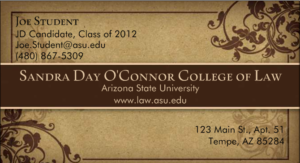Lawyerist recently wrote a great post about why lawyers need business cards. They are a simple yet effective tool to have when networking. You never know whose hands your card will end up. The same lesson is true for law students, and law students have more freedom to design cards that fit their personality.
Every law student should have business cards. Over the last year, I’ve picked up a lot of do’s and don’ts when it comes to selecting and designing a personal card. Every card should have the following information:
- Your Name,
- Your School,
- JD Candidate,
- Class of ______,
- Your Phone Number, and
- Your Email Address.
There are three main options for cards.
Option #1: School Business Cards
Many law schools give their students the opportunity to purchase business cards. These tend to have a simple and clean look. Students customize their cards with their personal information. This is my friend Stephanie Green’s card.

She realized after she had them printed that she shouldn’t have put her address on them because she’s moved twice since then. Additionally, you might not want to put your home address on your card because you never know who will end up with that information.
I was happy when my school offered business card for sale; however, I cringed when I saw the template. It was way too plain for me. All the white space was a turn off for me. I needed something with more personality and color.
Option #2: Personalized Business Cards
Vistaprint and Moo have many options for people who want more colorful and creative business cards. Vistaprint has many templates for free business cards that are suitable for law students. These companies make business cards for businesses, and the templates are designed to make the company the focus and not the individual. My classmate input his information exactly as the template suggested, and the result looked similar to this.

This design was perfect for his personality, but his card looks odd because you focus on the school and not him. Students who opt to have more personalized cards must remember that templates suggest where you put certain information but you can chose what information you put on it and where you put it. If I had this card as a law student, here’s how I’d do it.

I think it’s better for students to put a non-school email address, because the information will continue to be current if someone wants to reach them after they graduate. However, the email address must look professional – something like YourName@gmail.com.
Option #3: Untraditional Business Cards
Some people are extremely creative when it comes to their business cards. Jason Tenenbaum got his business cards from Moo. It has a picture on the front and a QR code on the back that links to his information.
A divorce lawyer has a sassy business card that’s perforated in the middle with the same information on both sides. It pushes the envelope on appropriateness, but it makes me laugh. It’s a great gimmick.
In some industries, it’s common to have MiniCards – half sized business cards. I considered getting these instead of business cards, but I changed my mind when I showed a MiniCard to a young up-to-date lawyer, and he couldn’t understand what it was. In the future, I think I will have both standard business cards and MiniCards and will let the setting determine which one I use.
Along with business cards, every law students should have a business card case. Without a case, the corners of the cards will become bent and dirty in a wallet or pocket. Reasonably priced ones are available from Amazon and VistaPrint, and more exciting ones are available on ThinkGeek and UncommonGoods.



